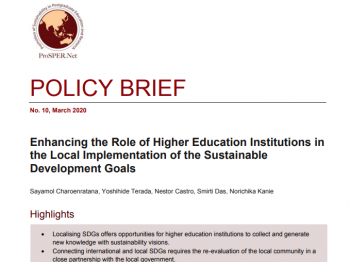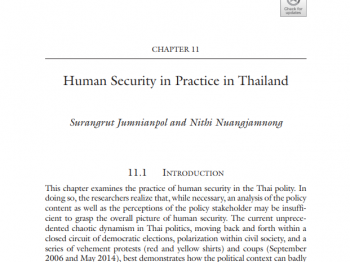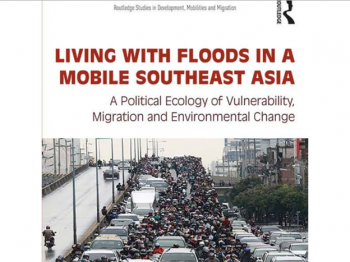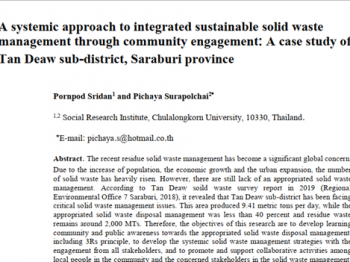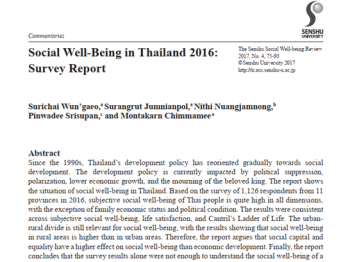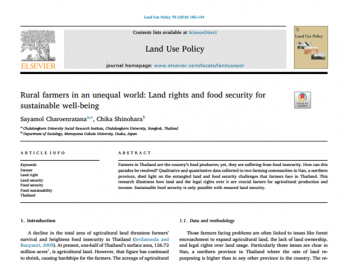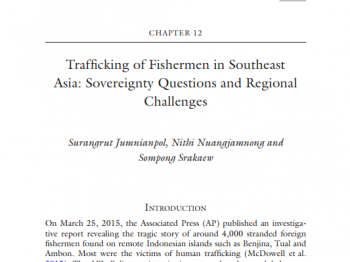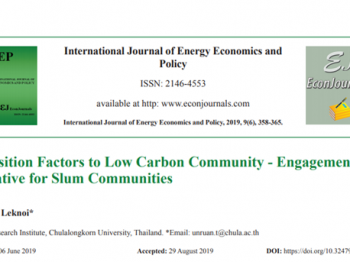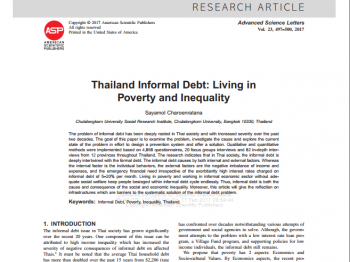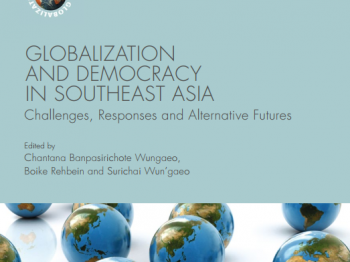สถาบันวิจัยสังคมฯ
Human Security in Practice in Thailand
Abstract This chapter traces the process of acceptance of human security in Thailand in terms of both concept and operationalization by reviewing literature and interviewing key stakeholders. The position of the Thai government on human security is Janus-faced. The Thai government capitalized on the concept of human security in 1994 at the time it was […]
Living with and against floods in Bangkok and Thailand’s central plain
In this chapter, Naruemon Thabchumpon and Narumon Arunotai present empirical research on the impacts of the major flood in 2011 in Thailand on three urban, one semi-urban and three rural communities. The chapter shows that whilst the rural communities are largely adapted to seasonal flooding, the 2011 flood increased vulnerability due to damage of property […]
A systemic approach to integrated sustainable solid waste management through community engagement: A case study of Tan Deaw sub-district, Saraburi province
Abstract The recent residue solid waste management has become a significant global concern. Due to the increase of population, the economic growth and the urban expansion, the number of solid waste has heavily risen. However, there are still lack of an appropriated solid waste management. According to Tan Deaw soild waste survey report in 2019 […]
Social Well-Being in Thailand 2016: Survey Report
Abstract Since the 1990s, Thailand’s development policy has reoriented gradually towards social development. The development policy is currently impacted by political suppression, polarization, lower economic growth, and the mourning of the beloved king. The report shows the situation of social well-being in Thailand. Based on the survey of 1,126 respondents from 11 provinces in 2016, […]
Rural farmers in an unequal world: Land rights and food security for sustainable well-being
Abstract Farmers in Thailand are the country’s food producers; yet, they are suffering from food insecurity. How can this paradox be resolved? Qualitative and quantitative data collected in two farming communities in Nan, a northern province, shed light on the entangled land and food security challenges that farmers face in Thailand. This research illustrates how land […]
Trafficking of Fishermen in Southeast Asia: Sovereignty Questions and Regional Challenges
Abstract Thousands of fishermen have fallen prey to human traffickers and have been found on distant Indonesian islands. This humanitarian disaster not only uncovered the problem of modern-day slavery but also revealed practices once considered normal but now unsustainable, within the fishing industry. The authors distinguish between three categories of sovereignty and argue that the […]
Transition Factors to Low Carbon Community – Engagement Initiative for Slum Communities
Abstract Thailand has been classified as one of the ten countries that are at high risk for long-term climate change due to greenhouse gas emission, directly connected with the population size and urbanization. In 2019, Bangkok has 2,070 communities, one-third are slum communities with increasing greenhouse gas emissions. This research proposes a set of potential […]
Thailand Informal Debt: Living in Poverty and Inequality
Abstract The problem of informal debt has been deeply rooted in Thai society and with increased severity over the past two decades. The goal of this paper is to examine the problem, investigate the cause and explore the current state of the problem in effort to design a prevention system and offer a solution. Qualitative […]
Globalization and Democracy in Southeast Asia
This book questions why Southeast Asian nation states are struggling to adopt full-fledged liberal democracy and attempts to better understand the relationship between globalization and models of democracy. Country studies are covered mostly by native Southeast Asian scholars who analyse recent developments as well as specific concerns that have arisen from political crises, citizen uprisings, ethnic […]



